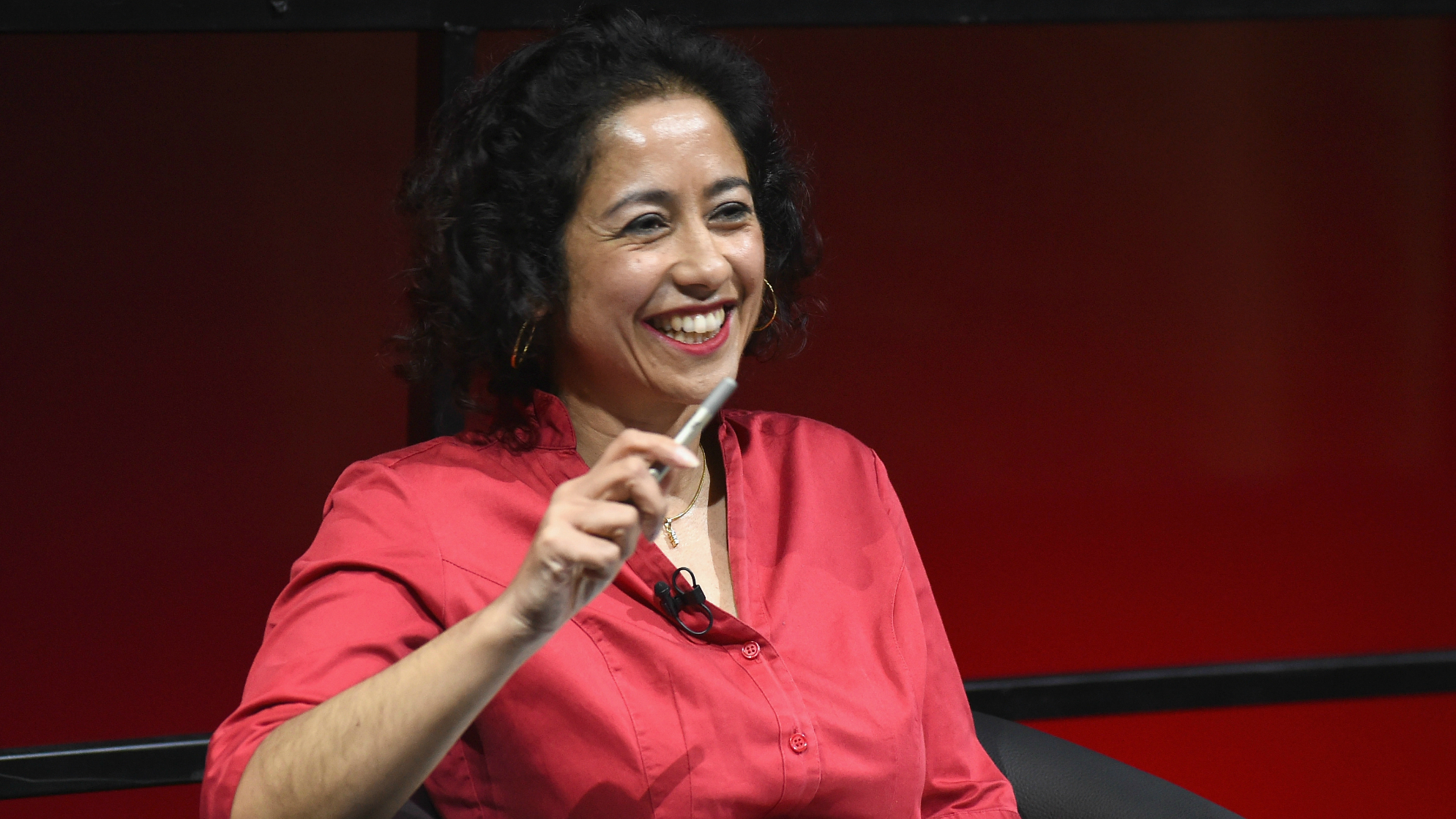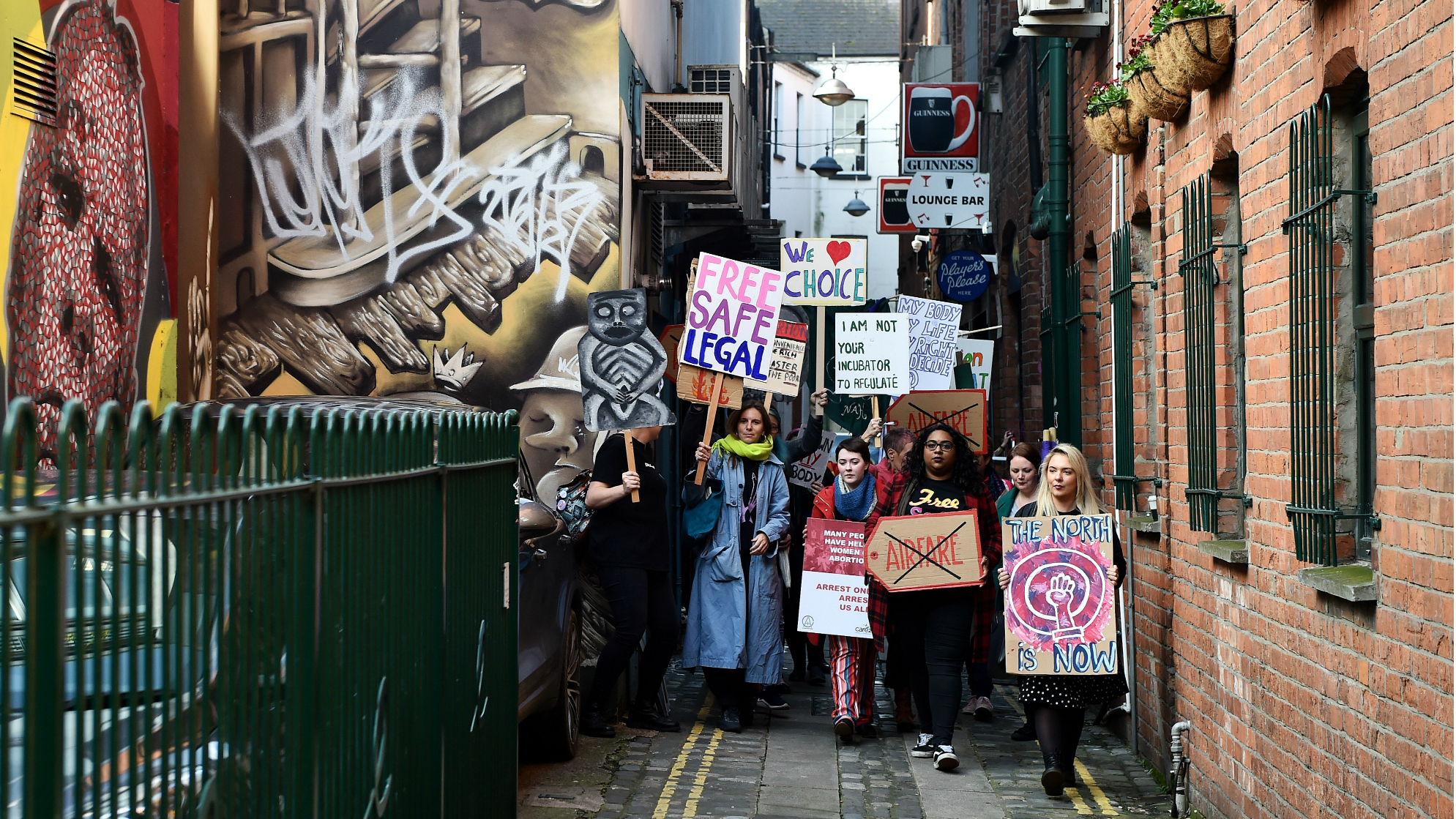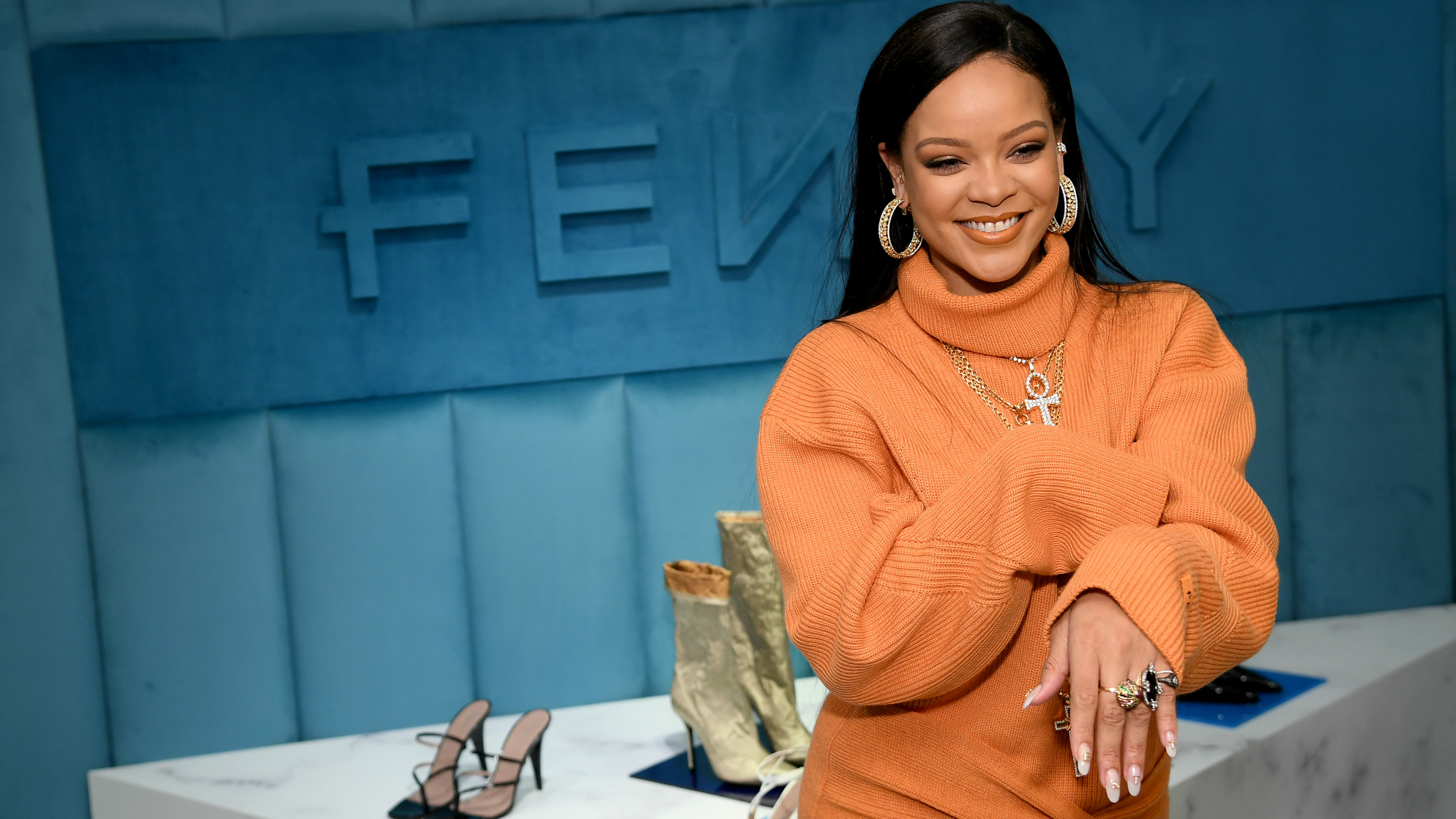It's 50 years since the Women's Liberation Movement, so what's changed?
Half a century ago today, hundreds of fed-up, badass women united to write down their seven basic demands for gender equality. So in the lead up to International Women's Day, we're taking a look at how far we've come


Celebrity news, beauty, fashion advice, and fascinating features, delivered straight to your inbox!
You are now subscribed
Your newsletter sign-up was successful
Half a century ago today, hundreds of fed-up, badass women united to write down their seven basic demands for gender equality. So in the lead up to International Women's Day, we're taking a look at how far we've come
'Miss-fortune demands equal pay for women, Miss-conception demands free abortion for all women, Miss-placed demands a place outside the home.' Emblazoned on placards outside the Miss World competition in 1970s London, these were the battle cries of the Women's Liberation Movement.
40 years had passed since suffragettes had secured our right to vote, yet women were still living in a Britain as void of equal job opportunities as it was rife with violent backstreet abortions and university lecture halls drowned out by testosterone-fuelled opinions.
Facing a nauseating expectation to keep their mouths shut and look pretty, women chose to start yelling instead - and a second wave of feminism swept its vivacious way across the UK. Uniting together at the University of Oxford for the liberation movement's first conference on 27th February 1970, over 500 females began outlining their seven basic demands for gender equality. Now 50 years on, we take a look at exactly how these demands are shaping up in 2020...
1. Equal pay
The wonderfully wild energy of the liberation movement was such that the government couldn't ignore the demands of the feminists, with The Equal Pay Act of 1970 being its first concession. For the first time in history, parliament agreed to ensure that men and women doing work of equal value would be paid the same amount. Seems like a simple enough concept, right? Wrong. The implementation of this legislation has done little to close the gender pay gap in the last 50 years. In fact, a 2019 study found that 78% of the biggest companies in Britain continue to pay men significantly more than women - with the World Economic Forum reporting back in 2018 that it will take 202 years before the gap is closed. Cool. There's an even bigger problem however, in the amount of small private companies (1,326,000, as it happens) that don't have to publicly disclose their payment figures. This makes it difficult for us to accurately track the state of equal pay within the UK, by placing a restriction on our ability to hold shi- I mean - archaic employers to account.

2020 has seen some positive developments, though. In January, BBC presenter Samira Ahmed won the case she brought against the broadcasting giant over equal pay. Ahmed claimed Jeremy Vine was paid more than six times the salary she received for doing the same work. With such a high-profile case bringing the issue of equal pay to the forefront, there's hope that more women will fight back for greater pay transparency.
2. Equal education and job opportunities
On the surface it looks as though, quite miraculously, the gender gap in the area of education has done a total 180. As well as consistently outperforming their male classmates in school exams, young women are also a third more likely to go to university.
Celebrity news, beauty, fashion advice, and fascinating features, delivered straight to your inbox!
Despite these developments, however, a 2019 study from the Higher Education Policy Institute found that more young men are accepted onto highly-valued science, engineering and research courses than women - linked to ongoing gender stereotyping around STEM subjects. When it comes to the world of work, the same report found that although women are more likely to find jobs within six months of leaving university, it's men that dominate professional occupations and earn higher incomes on average.
3. Free contraception and abortion on demand
With free contraception now available for all women on the NHS, we've come some way in terms of removing shame from the female (or, human) desire to have sex outside the boundaries of procreation. Existing barriers to sexual health services often take the fun out of the sex we're having, though, with a survey of 3,000 women revealing that 37% couldn't get contraception services locally. As well as this, the mandatory consultations that go hand-in-hand with paying a visit to the pharmacist for the morning-after-pill continue to leave many girls and women feeling 'uncomfortable, embarrassed or judged' - not to mention the fact it will set you back anything between £15 - £36.
The introduction of The Abortion Act in 1967 rolled out safe abortion services to women across the UK, putting a near end to the tragic practise of backstreet abortions. Although for the women over in Northern Ireland, this process was slow - painfully so, as up until last year, abortion was still criminalised in the region. This left many women with no choice but to make the bleak and expensive trip across the water to access abortion care.

4. Free 24-hour nurseries
Shifting attitudes around the ability of women to have both children and a career means a higher demand for free childcare today than back when the liberation movement was in action, with two-thirds of mothers now working, in comparison to less than 23% in 1971. A higher demand does not necessarily equate to accessibility however, as our current government provisions severely limit the scope of free healthcare on offer.
As it stands, parents in England can access 15 hours free childcare a week for 3-4 year olds, with some low-income families eligible for 30 hours free care a week. But many local authorities have revealed a severe lack of places for families eligible for the 30-hour offer, impacting the flexibility of working mothers. With the price of a part-time nursery place for a child under two averaging at £122 per week within the UK, it's also obvious to see how the age limitation of this legislation has mothers second-guessing their ability to re-enter the workforce.
5. Financial and legal independence
In contrast to the good old days before the liberation movement, women no longer need male permission before obtaining a credit card. Although still sadly lagging behind our male counterparts regarding management of personal finances, a 2018 study by Forbes claimed that today's young women are poised to become some of the most financially independent women in history.

As well as this, the progressive change in societal attitudes over time means that many women are no longer bound by the obligation to marry before leaving the childhood home, allowing us to take up space within society in our own independently-owned homes. Women can also, of course, now apply for their own mortgages, but with the percentage of single UK women holding down almost half the number of mortgages as single men, (10% vs 17%) it's clear that property ownership in the UK continues to favour women who are coupled up, unless they have access to inheritance or parental support.
6. An end to all discrimination against lesbians and a woman’s right to define her own sexuality
Sexual activity between women has never been subject to legal restriction, but that hasn't stopped discrimination from creating an unwelcome and threatening environment for LGBT people in the UK. Despite living in a society much more accepting today than 50 years ago, homophobic abuse is still rife, with a 2020 study finding that homophobic hate crimes in London alone have increased by 55% in five years.
Many of the incidents reported by female victims of LGBT targeted abuse appear to link to an existing gender bias around what the role of women in society should be, with terms such as 'dyke' still commonly thrown around in the online and offline sphere. The incident in November 2019 in which a young lesbian couple was brutally attacked by three men after refusing to kiss on a public bus remains a heartbreaking reality for more than one in five LGBT people. The figures are particularly alarming for trans people, with as many as two in five having experienced a hate crime or incident based on their gender identity in the last 12 months.
7. Freedom from intimidation by threat or use of violence or sexual coercion and an end to all laws which perpetuate male dominance and men’s aggression towards women
The Women's Liberation Movement saw the introduction of both the Domestic Violence Act in 1976 and the Women's Aid Federation in 1974, which provided support and refuge for women and child victims of domestic violence. We have more legal protections than ever for female victims of male aggression in 2020, but the statistics around sexual violence remain bleak. It's estimated that one in five women in the UK have experienced some type of sexual assault since the age of 16, with just over 3% of women experiencing a sexual assault every year.
The historic 'shut up and look pretty' rhetoric seemingly continues to dominate, with only three out of every 200 cases of reported rape actually being prosecuted and brought to trial. This is despite a sharp 61% rise between 2015-2019 in reports of rape made to police, brought on by a growing movement of women refusing to be silenced in a post #MeToo era.
Although often a tool for progressive change, the rise of social media has also placed women further at threat. A 2017 Amnesty study found than more than 25% of UK women experienced online abuse and threats of physical or sexual assault. Young women aged between 18-24 are particularly affected, with more than 37% admitting they'd experienced online abuse. With the regulation of online abuse still very much a growing area within law, it remains to be seen just how long women will have to wait before being able to take up a safe space in the online realm.

Although we still have a long way to go before reaching the equality our liberation sisters set out to achieve, personally, I'm pretty grateful to be a woman in 2020. Limitations are still put upon us, sure, but the increasing volume of our voices has ensured that we're certainly no longer defined by them.
If reading this article made you feel angry, I don’t blame you, because I felt kinda angry writing it. But this anger is the same anger that united the 500-strong Women’s Liberation Movement together to coin the stunning phrase, ‘We’re not pretty. We’re not ugly. We’re angry’ 50 years ago. It’s the same anger that moved them to pen the demands that gave us the protection to take up more space within society - it’s a force for change. We may still have a tough fight ahead of us, but we’ve come a bloody long way, too.
Niamh McCollum is Features Assistant at Marie Claire UK, and specialises in entertainment, female empowerment, mental health, social development and careers. Tackling both news and features, she's covered everything from the rise of feminist audio porn platforms to the latest campaigns protecting human rights.
Niamh has also contributed to our Women Who Win series by interviewing ridiculously inspiring females, including forensic scientist Ruth Morgan, Labour MP Stella Creasy and ITV’s former Home Affairs Editor Jennifer Nadel.
Niamh studied Law in Trinity College Dublin. It was after enrolling in a Law & Literature class on her year abroad in Toronto that her love of writing was reignited. In no particular order, her big likes are Caleb Followill, hoops, red wine, sea swimming, shakshuka and long train journeys.
